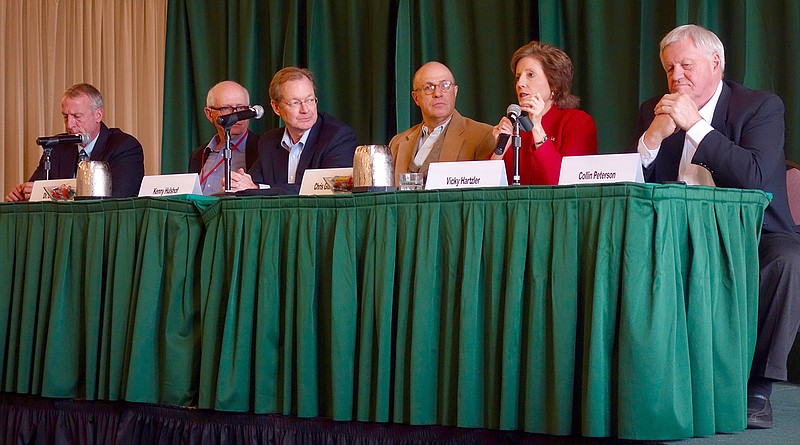OSAGE BEACH, Mo. - Congresswoman Vicky Hartzler, R-Columbia, said crop insurance programs must be protected, while other economic leaders said trade agreements must be protected during a Farm Bureau forum Sunday.
The Jefferson City-based Missouri Farm Bureau held the forum with congressional and economic leaders during its 2017 annual meeting Sunday through Dec. 5 at the Tan-Tar-A resort in Osage Beach. The forum discussed how a new farm bill will be passed in 2018 and what should be included.
The annual meeting brings approximately 1,200 farmers and farm leaders from across the state together to conduct Farm Bureau business, hold seminars and vote on board members. Gov. Eric Greitens and Missouri Attorney General Josh Hawley are expected to speak at the event today.
Congress last passed a farm bill in 2014, but it is set to expire at the end of fiscal year 2018, which ends Sept. 30. Hartzler, who grew up on a farm in Cass County and is Missouri's only member on the House Committee on Agriculture, said protecting crop insurance programs will be a vital part of this farm bill.
"We've got to keep our crop insurance program," Hartzler said. "That is the most important part of this farm bill."
Collin Peterson, D-Minnesota, serves as the ranking member of the House Committee on Agriculture. He and Hartzler said preliminary meetings about the 2018 farm bill have begun. Peterson said the bill will likely be written in January or February.
Because of money constraints though, the new farm bill will look similar to the 2014 farm bill, Peterson said.
"This is going to look very much like the current bill," he said. "The reason is, we don't have any money."
Peterson said an important change could come to the U.S. Department of Agriculture's Conservation Reserve Program, which allows farmers to remove environmentally sensitive land from production in exchange for a yearly rental payment. The program also requires farmers to plant species that will improve environmental health and quality.
Peterson said current rental prices are low, and he wants rental prices to be raised in the new farm bill.
"What we hope to do is use the price to get some of the good land out and get some of the land that should be covered in," Peterson said.
In January, President Donald Trump announced the U.S. would withdraw from the Trans Pacific Partnership. The 12-nation trade deal opened new markets to U.S. farmers and trade from the deal totaled $62 billion in 2015, according to Reuters.
Republican Kenny Hulshof formerly represented Missouri's ninth congressional district from 1997-2009. He understood Trump campaigned on removing the U.S. from the TPP, but was still disappointed with the decision.
"I'm of the mind that I would like to have more customers around the world to buy my corn and my soybeans, and my wheat," Hulshof said.
Bob Young, the former chief economist for the American Farm Bureau Federation, said U.S. farmers don't have enough cold storage available to store all the meat produced; so much of it is shipped overseas. The decision to withdraw from the TPP could have wide-ranging effects on price.
"I don't think we have a clue at recognizing how many meat products we're trading in this day and age," Young said. Also, pulling out of the agreement could have an effect on prices if the action were to upset countries such as China, Japan, Mexico or Canada.
Hartzler said afterward that the TPP opened many new doors for farmers and removed a lot of barriers that put U.S. farmers at a disadvantage.
"The TPP worked to phase out a lot of those barriers," Hartzler said. "So, to back out was a disappointment."
In November, the remaining 11 countries from the agreement announced they struck a new deal without the U.S. that includes major U.S. allies like Japan, Canada and Mexico.
Hartzler acknowledged the decision to pull out of the TPP puts the U.S. at a slight disadvantage. However, she said the U.S. is working to form trade agreements with those countries.
"There's still opportunity to get agreements done in a bilateral fashion, but they need to be very aggressive," Hartzler said.
President Trump also suggested this year that the U.S. could drop out of the North American Free Trade Agreement.
Missouri Farm Bureau President Blake Hurst also expressed concern about that possibility.
"We have progress we can make in the renegotiation of NAFTA," Hurst said. "But the most important thing is we do no harm."

